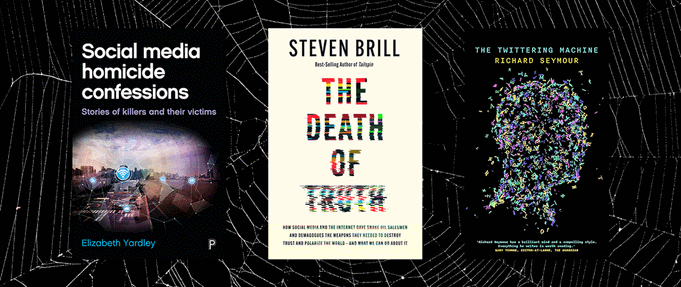In this algorithmic age, most of us are heavily reliant on social media platforms to stay in touch with our friends and family. But alas, the easy connectivity and the illusion of connection come at the steep cost of one’s privacy.
Tech companies are notorious for selling private data to third parties, feeding us personalized ads, and making it easier for strangers to learn everything about us based on our online footprints.
Thus, instances of cybercrimes, be it stalking, bullying, or harassment, have proliferated despite strict content moderation policies, even as spending long hours doom-scrolling on the apps has harmed our mental health.
So, if you’re curious to learn how social media is linked to certain crimes, or the insidious ways these apps have been designed to promote addiction-like behaviors in users, these non-fiction books promise to be rather enlightening reads.
Who knows—you might even be tempted to quit social media once you learn the whole truth!
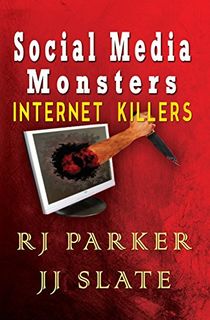
Social Media Monsters: Internet Killers
If you’ve ever wondered what the nastiest thing could happen if your Instagram stories are public, R.J. Parker’s book might just confirm your worst nightmares.
Social Media Monsters: Internet Killers focuses on how serial killers and psychopaths have used social media apps and chat rooms to locate, stalk, exploit, and even kill their chosen victims.
In the stories compiled in the book, Parker highlights how the most innocuous of social media platforms can become a criminal playground for certain kinds of killers, while also providing some tips on digital privacy and offering psychological insights into the twisted minds of such individuals.
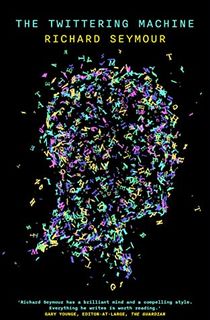
The Twittering Machine
Richard Seymour’s compulsively readable The Twittering Machine probes deep into the underlying structures and interface designs of social media apps, and argues how such platforms are essentially “addiction machines” not unlike the slot machines found in a Las Vegas casino.
Through scientific research and insights from tech specialists, Seymour reveals how social media apps are designed to hijack specific parts of the user’s brain, encouraging them to spend more time on these platforms, thereby perpetuating the cycle of misinformation, ads, and political conspiracies.
Above all, Seymour highlights how our constant engagement with social media, in the name of connection, might ultimately strip us of our essential humanity. A chilling and thought-provoking read.
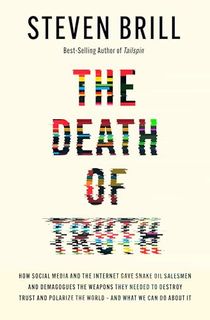
The Death of Truth
Steven Brill’s latest non-fiction book, which bears a lengthy subtitle—How Social Media and the Internet Gave Snake Oil Salesmen and Demagogues the Weapons They Needed to Destroy Trust and Polarize the World—And What We Can Do About It—offers a new manifesto for the digital age.
Meticulously researched and illustrated with numerous examples, The Death of Truth emphasizes how social media algorithms lead to the creation of “echo chambers”—limiting the types of ideas or factual news that users are exposed to, and making it harder to separate fact from fiction.
From conspiracy theories to hoaxes, such platforms are quite adept at spreading misinformation—a feature that has been weaponized by politicians and corporations alike.
Brill also provides the reader with practical and actionable tips to protect themselves and advocate for a better world.

Social Media Homicide Confessions
Increased social media usage has often been linked to worsening mental health symptoms. The constant prompts to “share” how one’s day is going, as well as the regular status updates from mutuals who ostensibly live their best lives, can lead to a feeling of FOMO and promote narcissism.
And in certain individuals, this can even tip them to the dark side, as Elizabeth Yardley examines in her book, Social Media Homicide Confessions: Stories of Killers and their Victims.
The book focuses on three criminal cases where killers actually confessed on social media about their crimes, and instead of treating these cases as aberrations, Yardley argues that they point to a changing world where more and more people are craving attention and notoriety—at any cost.
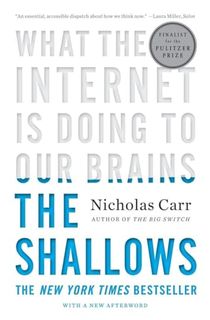
The Shallows
Although published a while back, The Shallows by Nicholas Carr remains as relevant as ever in exposing how social media and internet technology are rewiring our brains for the worse.
Blending philosophy with science and cultural commentary, Carr weaves a compelling history of human intelligence as it developed through the ages and how modern technology is rerouting our neural pathways—eroding our critical thinking skills and the ability to focus—thereby keeping us “distracted” from the big picture.
A Pulitzer Prize finalist, The Shallows is a must-read for anyone curious about the science behind social media apps and all the sordid secrets tech companies strive to keep hidden.
Featured image: Getty Images / Canva
